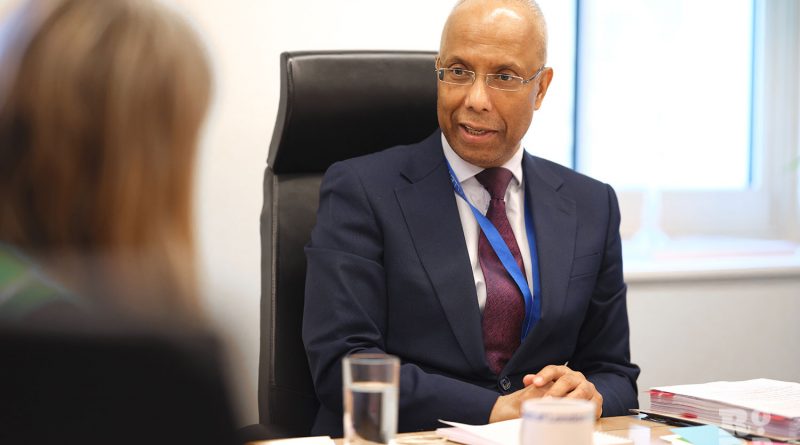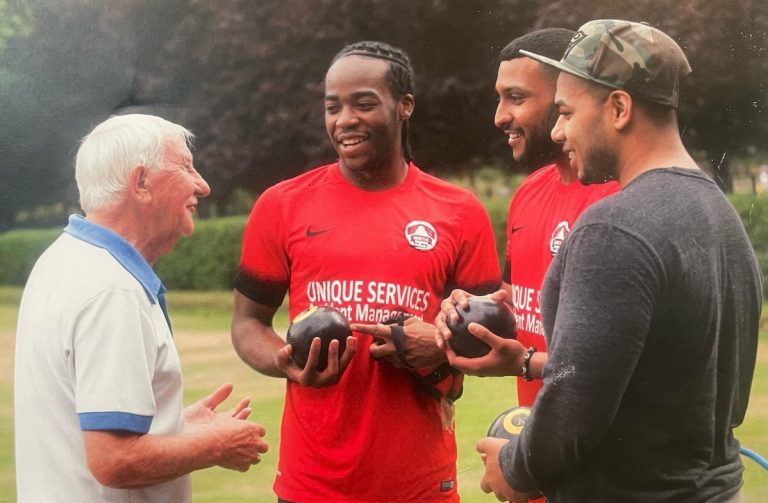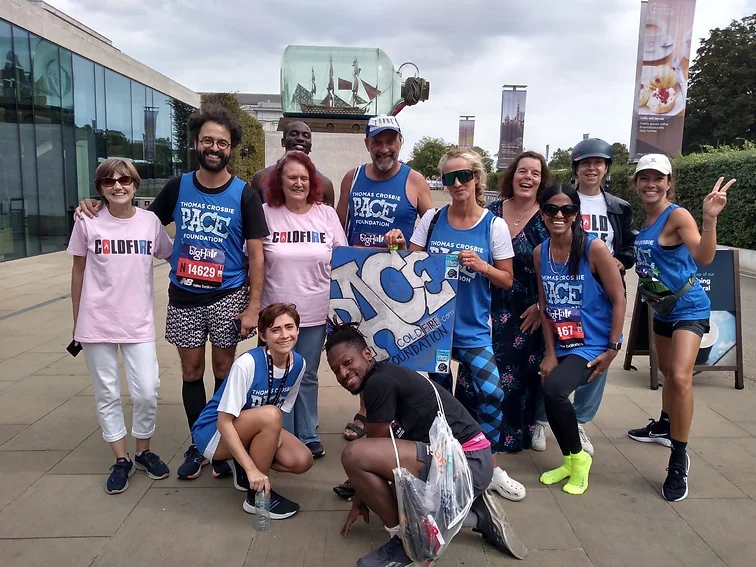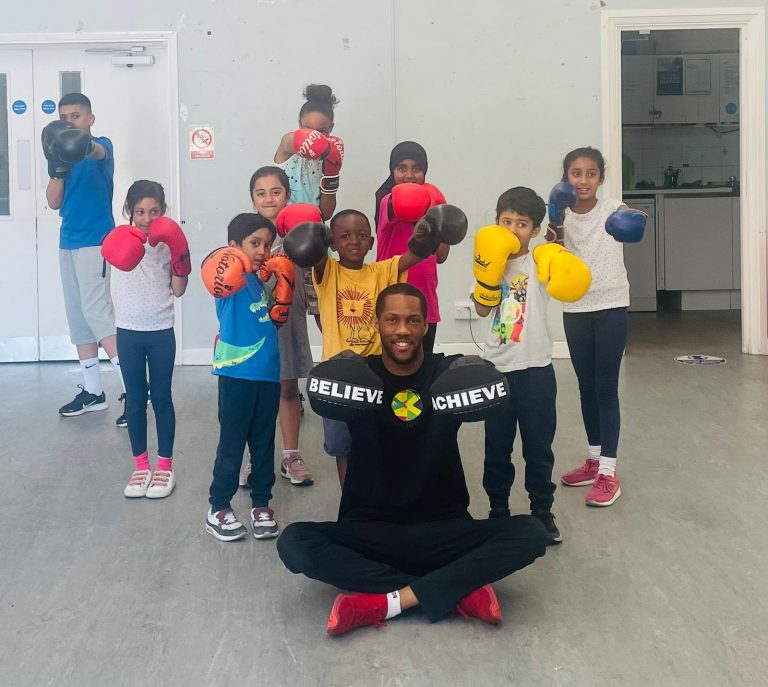Mayor Lutfur Rahman: the man behind London’s most ambitious anti-austerity budget
Perceived by some as unknowable and opaque, Mayor Rahman appeals to the people of Tower Hamlets to ‘judge us on the next three years,’ after passing Aspire’s budget for 2023-26.
Seven months into his mayorship of Tower Hamlets Council, Mayor Rahman wrote in Jacobin socialist political magazine: ‘ultimately, politicians are vectors for the policies they offer … In rare instances where politicians do manage to ride to power on personality alone, they are quickly found out; the Emperor’s New Clothes are quickly deposed alongside the Emperor.’
And yet, while politics is not a personality contest, in order to build trust, galvanise supporters and win over disbelievers, leaders must be knowable to the people and surely humans are not merely vehicles for legislation.
It’s not Lutfur Rahman’s style, however, to give much of himself away. In the run-up to the Mayoral elections in 2022, Rahman did not attend media interviews or hustings opting instead to build allyships by making in-person visits. Even now, it is not often that we hear him extemporise at Council meetings and public announcements and he has only recently published a website.
However, on a sunny afternoon in the new Town Hall in Whitechapel, we were granted an exclusive meeting with the Mayor, squeezed into his busy schedule the day after the Council’s budget passed on Wednesday 1 March and peppered with knocks at the door from Council members demanding his precious time.
With the Mayor’s office in the former Royal Hospital building still under construction, Rahman welcomed me warmly into a generic, brightly lit meeting room, the smell of paint still fresh from the new Town Hall’s recent renovation.
I want to win over everyone with the budget. Yes, judge me on my personality and my character but also judge us on our policies and our politics and what we’re doing for the borough.
Lutfur Rahman
Four-year-old Lutfur Rahman moved from Bangladesh to Bethnal Green with his brother and mother in 1971, joining his father who had made the move to Tower Hamlets several years earlier. The second of four siblings, Rahman’s two younger sisters were born after his family arrived in the East End.
Rahman attended Lawdale Primary School in Bethnal Green for four years before moving to Marner Primary and eventually Bow Secondary. His English-speaking skills quickly surpassed those of his parents, and before long he was acting as a translator for his mother and other members of the Bengali community, accompanying them to the housing office or the GP surgery.
Living in Bow for nearly 10 years, Rahman still feels a natural affinity to this part of the borough and looks back fondly on his outings collecting conkers in Victoria Park. Thereafter, the Rahmans moved to Spitalfields where the Mayor lives today, and where you might find him at the market on a Sunday morning enjoying a savoury veggie breakfast pancake.
Rahman entered local politics in 2002 when he was elected as Labour Councillor for Spitalfields and Banglatown ward. By 2008, he was the leader of the majority Labour Group on Tower Hamlets Council and was initially selected as the party’s mayoral candidate but left due to disputed claims of rigging the Labour Party ballot which Rahman alleged was a racially motivated attack on him. Rahman went on to contest the election and won it as an independent, becoming Britain’s first Muslim executive Mayor.
Winning the election again in 2014, the vote was subsequently declared void and in 2015 Rahman faced accusations of election fraud. He was found guilty in the civil court but there was not enough proof for this to be taken to the criminal court and he has always maintained his innocence.
Barred from standing for five years, Rahman founded the Aspire Party in 2018 and in May 2022 was re-elected as Mayor of Tower Hamlets, gaining 54.9% of the votes and winning victory over the Labour Party incumbent, John Biggs. The overall turnout for the election was 41% and the twenty-two seats that Rahman’s Aspire Party won made it the first time that a party that was neither Labour, Conservative, or Liberal Democrat has taken control of a London council in over sixty years.
Such an unprecedented victory was met with enthusiasm by Rahman’s followers of all ages in the Bengali community and by his many supporters on the far left; Rahman himself considered his victory as ‘vindication in the court of public opinion.’ But it hasn’t been easy for him to quell criticism from his political opponents while trying to deliver on his radical manifesto promises.
Notably, Rahman’s promise to ‘reopen our roads’ and reverse Liveable Streets schemes in Tower Hamlets sparked criticism from those who supported Low Traffic Neighbourhoods and School Streets and there have been claims from his opponents that Aspire has not been transparent about consultation results.
The noticeable gender imbalance of Rahman’s party, whose 24 Councillors are all Bengali men, has also caught the attention of commentators that highlight the contradiction between his aim of being a Mayor for all of Tower Hamlets and the lack of female representation within Aspire.
Mayor Rahman’s 2023-26 Council Budget has been hailed for pioneering a new model for anti-austerity fiscal expansion that will see many services brought back in-house. But questions remain even for the supporters. In the short term, the ambitious budget costing £40 million in 2023 – an increase of £20 million from Labour’s highest annual budget expenditure – will be funded by the Council’s large reserves left by the previous administration. However, concerns have been raised about its financial sustainability and how Aspire will account for such high spending.
We put this question among others to Mayor Rahman. Here in his own words, is a window into the thoughts and experiences of the man behind Tower Hamlets’ most ambitious budget that vows to be for the many, not the few, and aims to alleviate poverty in London’s most deprived borough.
Improving education is close to your heart and central to the new budget. What were your school days like?
‘It was a different time growing up in the 70s, there were only three of us Asian kids at Bow School. There were a lot of Afro-Caribbean kids who went with me from primary school so that provided a bit of a cushion but it was also when the National Front was rampant in the East End.
‘Thankfully I never got into any difficult situations because the teachers protected the three of us and the Afro-Caribbean kids had older siblings at the school who looked out for them, but there was a lot of name-calling that went on. If it wasn’t for my teachers I don’t think I would’ve got on the education ladder or gone into the profession that I have.
‘I don’t think my friends would’ve called me a natural leader back then, I was just one among them but if someone needed help we’d go out of our way to help each other.’
You talk about the strong influence of the women in your life but there is an unmistakable gender imbalance in Aspire which has no female councillors. How are you ensuring you properly serve all people, men and women, across the borough?
‘The gender balance was mere chance, that was the card I was served with. I was out of politics for seven years, and I decided to return at a late stage in 2021 when John Biggs held a referendum on whether to abolish the Mayoral system or to keep it. I strongly believe in the Mayoral system because it is a form of direct democracy and gives the people access to the person at the helm of the Council. So that’s when I got back into politics again, to try and help with the campaign to keep the Mayoral system.
‘Then when I decided to run for Mayor again not many people wanted to be associated with me or Aspire. We weren’t an established party and people didn’t think it would give them much of a career choice in politics if they came with us. So men and women, but women in particular weren’t keen.
‘The executive members of Aspire did their best to attract women, and Aspire’s general secretary, Lilian Collins, is a white woman and a community activist and politician. I also tried to persuade a lot of women I know in the borough to run for the party, but some of them couldn’t because of job restrictions, or because they have families with young children. Or some were inhibited by the mainstream media and the name-calling that was going on at the time which created fear. They didn’t want the exposure that would come with running in a party with me at the helm because a lot of people were vilifying me and they didn’t want to be vilified, especially those with young families.
‘But they did support me. The 41,000 people who voted for me weren’t all men, in fact over 50% were women and I have a strong network of females in the borough who I can count on for support and guidance. And for me personally, women have played a pivotal role in my life. I hardly saw my father because he was working two jobs to put food on the table from five in the morning until 10 at night, so it was my mother, my maternal auntie and my grandmother who had a huge influence on me, then subsequently my sisters and now my daughter who works for the NHS, she’s a very mature young lady and I consult her a lot. And my wife, I went through a hell of a time eight years ago and she stood by me and we’ve been married for 30 years, I wouldn’t be here without her.
‘So the point is that it’s sad, the card I was dealt having all men, but it wasn’t by design. Firstly a lot of women didn’t come forward and secondly the ones who came forward unfortunately didn’t win. But my chief of staff, Amy Jackson, and my PA are women. And we have fantastic female officers in the Council who have a huge influence on me and my policies I can assure you. I would like to have more women than men going forward in Aspire, I would like to have 51% women and 49% men.’
You say it’s dangerous when politicians are judged on their personalities rather than their policies. Will you struggle to gain people’s trust if they don’t feel like they can relate to you on a personal level?
‘Sure. I believe that you’re never going to get 100% personal relationships. Even within a family relationships vary. Now we have 320,000 people in the community and I would love to have the trust and confidence of everyone but there’s not one human in the world that can have the trust of everyone.
‘I have surgeries twice a week and I’m here to serve each and every person in this borough. Even if you didn’t vote for me, you have a right over me and I am the Mayor for you. I treat people with respect and courtesy, whether they like me or not. I’m a public servant and I’m a person of faith. So I’m responsible and accountable to the people of this borough, but I’m also accountable to Allah, to God, and that is the biggest accountability to me.
‘I want to win over everyone with the budget. Yes, judge me on my personality and my character but also judge us on our policies and our politics and what we’re doing for the borough.’
You came under criticism for not attending hustings or holding media interviews in the run-up to the mayoral elections last May. What were your reasons for doing this?
‘I made myself accountable in the most directly democratic way possible, ie to the people of the borough. I was very visible throughout the campaign, and people had plenty of opportunities to quiz me on anything they wanted to know, as often they did. Interviews like this one will show that I have no problem speaking to the media, but during the election, I was busy getting out into the borough and meeting people.’
You criticised Labour for not spending the borough’s large reserves on supporting the people of the borough. In hindsight, are you grateful they left you such large reserves?
‘Labour failed to deliver for the people of this borough. No one leaves money behind, if you’re a politician you want to spend it on public services, I think they just failed to do so. They didn’t have the vision or the policies to deliver a better Tower Hamlets. So yes we’re grateful the money’s there, but that wasn’t a gift to us, that was their failure to deliver. Why cut services to then just put the money in the bank? It just doesn’t make sense.’
Where will you find the income to sustain such an ambitious anti-austerity budget over the next four years?
‘We need to find £37 million over the next three years. In my first term as Mayor under Mr Cameron and austerity, we had to find £125 million and we found that money. We balanced the books over five years and invested in and protected financial services. We were the highest deliverer of social housing. We didn’t close one swimming pool or one library. It’s about having that imagination and having that creativity and tightening your belt. If we found £125 million over five years we will find £37 million over three.
‘I am very conscious of my responsibility but we are a fiscally responsible council. I left behind a healthy reserve of £402 million when I left in 2015 and I’ve always protected financial services. We have over 800 consultants and 30 million pounds were spent on consultants last year, so I’m going to look into that. And we’re looking to the reorganisation of the Council. We’re looking into partnering up with other local authorities if necessary and looking at creative ways to reduce costs and improve our buying power. But I will also protect the low-paid workers and protect the frontline workers as I always did, and we’re not going to fire and rehire staff on lesser terms.
‘I’ve just come in and delivered my first budget. Rather than jumping to conclusions, judge us on the next three years.’
What has been the biggest challenge you’ve had to overcome?
‘The biggest challenge was growing up in a borough with very serious poverty on the one hand, and extreme wealth on the other. I saw what that dividing line did to many in my neighbourhood and my community; how it affected them psychologically. I knew I wanted to dedicate my life to doing something about it, but it was a challenge to witness.’
What politician or leader (dead or alive) inspires you most?
‘Tony Benn. Wonderful integrity, brilliant determination, and the oratory skills to match.’
What is the best way to build bridges between people?
‘We build bridges through words and actions. A democracy is a competitive power and I’m grateful to the people of the borough for giving me another chance and re-electing me after not being there for seven years. And I hold no grudges. It’s a short life and I need to make the most of the time I have on my hands to deliver for the people. It is through our actions, our policies and our deliveries. It is our vision to bring about rapid change, invest in public services and change how services are delivered.
‘I hope and I pray, and I plead to the people of the borough, to please judge us on what we’re going to do for the borough, and what we’ve started to do with the budget.’
In next week’s article, we will be taking a closer look at the budget itself.
If you enjoyed this piece, you might like our article about Tower Hamlets becoming the first London borough to extend universal free school meals to secondary school pupils.








Looking for a bright islamo-socialist future under leadership of “Rahman’s party, whose 24 Councillors are all Bengali men”
You better keep a close eye on this one.